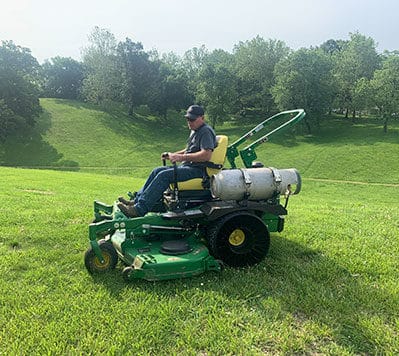City of St. Charles Parks & Recreation Realizes Benefits with Propane Mowers
Being Responsible Stewards of Environment and Budget
St. Charles Parks & Recreation prides itself on being “an extension of your own backyard.” For St. Charles and surrounding area residents, that means an additional 800 acres of backyard to enjoy as their own.
A team of 15 full-time and 20 to 30 seasonal employees manages 24 parks in and around the city. These parks include about 275 acres of routinely mowed turf (weekly or biweekly) and about 55 acres of intensively mowed turf (every three to five days) covering 43 athletic fields.
With hundreds of acres to mow each week, the department’s 10 mowers stay busy during peak mowing season. Fortunately, thanks to the clean and efficient energy of propane, Parks & Recreation Assistant Director Chris Atkinson and his staff experience a wide variety of benefits.
“I think people have an expectation that parks departments should do their work in an environmentally-friendly way,” Atkinson said. “Propane also made sense for our department financially.”
In operation for more than 100 years, St. Charles Parks & Recreation is one of the oldest parks departments in the state. It was also one of the first departments to make the transition to propane for its mowing fleet. About six years ago, Atkinson and some of his peers attended a Missouri Parks and Recreation Association (MPRA) conference and a presentation about propane mowers. He was intrigued by the benefits of propane and brought the idea back to his department.
“Propane is environmentally friendly and it makes sense financially, but we’ve also realized that it saves our on-staff mechanic a lot of time,” Atkinson said. “Because propane burns cleanly, propane engines require fewer oil changes and maintenance. With the eight propane mowers we have, we’ve seen many benefits without losing any efficiencies.”
According to Atkinson, one of the biggest benefits propane brings to St. Charles Parks & Recreation is cost certainty. The department negotiates the price it pays for propane for an entire year or mowing season, which usually lasts from around April 1 through October.
“When we operated gasoline mowers, we were at the mercy of gas companies,” Atkinson said. “When gas prices at the pumps get up to three or four dollars per gallon, that’s a significant budget expense. With propane, we know what it’s going to cost. We’ve removed that uncertainty, and we have much greater control over our fuel budget.”
To store and use propane, the department has a 1,000-gallon propane tank on site at, one of its maintenance facilities. At this facility and at a second location, filled propane cylinders are stored in locked cages ready to be used across the 24 parks managed by the department. Staff members are trained to fill the cylinders from the larger tank. Atkinson noted, “I really like that a canister of propane can last a full mowing day, which is between six and eight hours.”
When asked what he enjoys most about his role with St. Charles Parks & Recreation, Atkinson said it’s knowing that he and his team contribute to people enjoying their city’s parks.
“Nearly every person comes to our parks to have fun and make memories–we’re the fun department,” he said. “It’s rewarding to know that people are going to show up to have fun and make memories with their children, friends and families.”
Another benefit Atkinson and St. Charles Parks & Recreation have experienced with propane is rebates through MOPERC’s Lawn Equipment Assistance Fund (LEAF) program. For each new propane mower purchased, the department is eligible to receive a $1,000 rebate that can be put back into the budget to help make more great memories for park visitors.
Atkinson is also grateful for his department’s relationship with propane marketer Marty Mills at MFA Oil.
“Marty has been with us since day one,” he said. “MFA provides our tank and coordinates the delivery of our fuel supply. Marty helps us with staff training and certifications as well as rebate applications.”
In addition to its mower fleet, St. Charles Parks & Recreation utilizes the versatility of propane in other ways. Propane powers a trailered commercial blower unit that clears debris off paths and trails. The Department also has a propane-powered commercial turf sprayer, and there is a propane-powered forklift to unload trailers at its warehouse.
“We don’t want to stop there,” Atkinson said. “Looking ahead, we want to continue to transition equipment to propane. We have a lot of fleet vehicles driven on our streets that we’d like to be able to transition to propane autogas.”
For St. Charles Parks & Recreation, propane helps the department and city be responsible stewards of not only the city budget and the environment, but it allows the staff to create opportunities for great memories for St. Charles residents.
